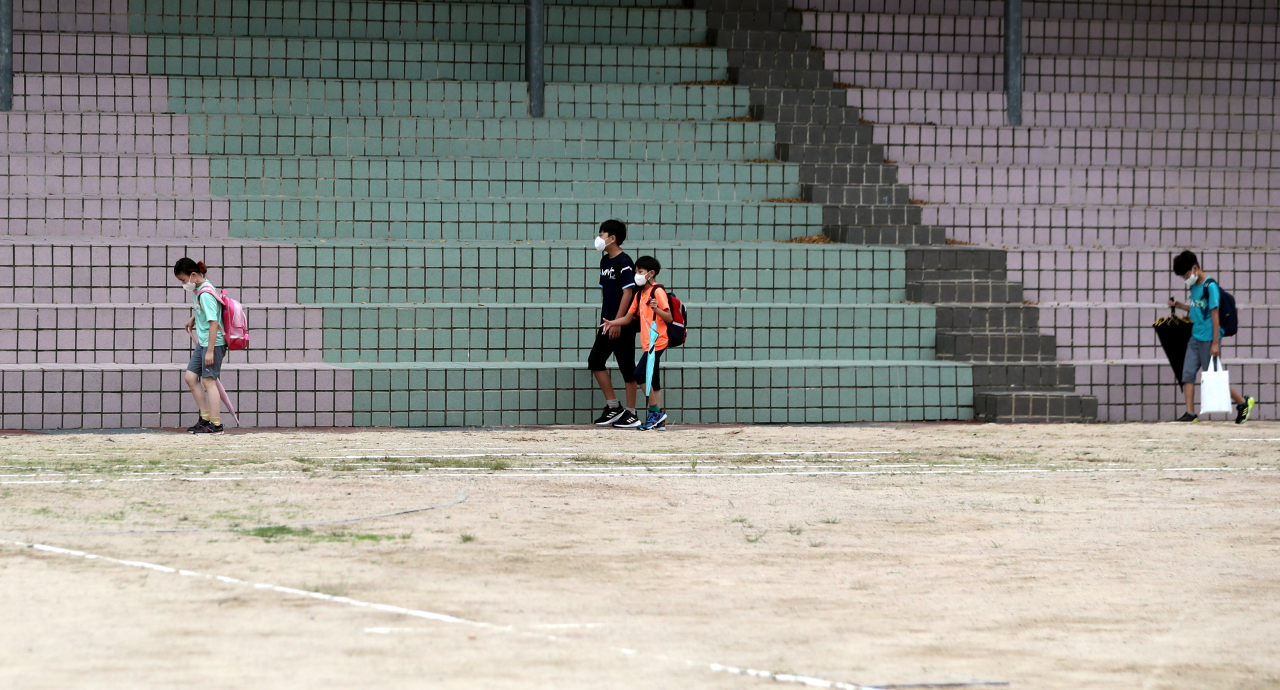 |
Students head to their classrooms at an elementary school in Busan, 453 kilometers south of Seoul, on Wednesday. (Yonhap) |
South Korea's daily new coronavirus cases bounced back to over 2,000 on Wednesday, with the more transmissible delta strain rising sharply ahead of a major holiday this month.
The country added 2,025 more COVID-19 cases, including 1,992 local infections, raising the total caseload to 253,445, according to the Korea Disease Control and Prevention Agency (KDCA).
The tally marked a sharp rise from 1,487 on Monday and 1,372 on Tuesday. Daily cases have stayed above 1,000 for 57 consecutive days.
The number of patients normally falls over the weekend and rises later in the week as more people get tested, often breaching the 2,000 mark.
The country added seven more deaths from COVID-19, raising the death toll to 2,292, the KDCA said. The fatality rate came to 0.9 percent.
The number of patients with serious symptoms across the country reached 399, down 10 from the previous day. Critical patients have more than tripled from some 120 in early July, when the fourth wave began.
Health authorities said while the toughened social distancing measures have contained daily cases, the growing number of variant infections is troublesome.
Among 3,455 COVID-19 variant cases tallied over the Aug. 22-28 period, the delta strain accounted for a whopping 99.2 percent, the KDCA data showed.
The country also aims to toughen measures on arrivals from Peru and Chile starting Sept. 10, requiring them to undergo a seven-day quarantine at designated facilities on concerns over the lambda variant.
Health authorities plan to announce additional virus restrictions this week that will be applied throughout this month, especially to brace for the Chuseok holiday, which runs from Sept. 18-22 this year, when millions travel across the nation to meet families and relatives.
A total of 29.27 million people, or 57 percent of the population, have received their first shots of COVID-19 vaccines, and 15.74 million people, or 30.7 percent, have been fully vaccinated, the KDCA said.
So far, 180,667 cases of post-vaccination side effects have been reported, though 95.6 percent of them were found to be mild symptoms, such as muscle pain and fever. There have been 535 deaths following vaccination.
The country plans to provide at least one jab to 70 percent of the population by the end of September to create herd immunity in November.
South Korea, meanwhile, said it is currently in talks with US pharmaceutical giant Moderna Inc. to map out the supply of 6 million doses of vaccines.
Health authorities said they are also seeking ways to utilize Moderna shots bottled locally by Samsung BioLogics Co.
Samsung BioLogics plans to start the test production of Moderna's vaccine at its local factory as early as this week, although the volume is expected to be shipped overseas instead of being used here.
"We have requested multiple times that Moderna and Samsung consider allocating the jabs for local use, although no conclusions have been made so far," a local health official said.
Health authorities added around 1.5 million doses of vaccines will arrive from Romania in the coming weeks. The batch includes 450,000 doses of Moderna vaccines donated to South Korea by Bucharest.
Of the newly confirmed domestic cases, 662 were from Seoul, 630 from the surrounding Gyeonggi Province and 123 from the western port city of Incheon, the authorities said.
The southeastern port city of Busan added 68 cases, and its neighboring industrial city of Ulsan reported 68 more cases.
Additional infections from South Chungcheong Province reached 86, and those from South Gyeongsang Province came to 48.
Over the past two weeks, around 35 percent of the newly added patients had unknown transmission routes, and cluster infections accounted for 13.6 percent.
Imported cases, which include South Korean nationals, came to 33.
Arrivals from the United States accounted for nine, followed by Uzbekistan with eight.
The total number of people released from quarantine after making full recoveries was 224,319, up 2,618 from the previous day.
Around 88.5 percent of the patients reported here have been fully cured.
South Korea carried out 13,152,146 COVID-19 tests so far, including 57,429 from the previous day. (Yonhap)








